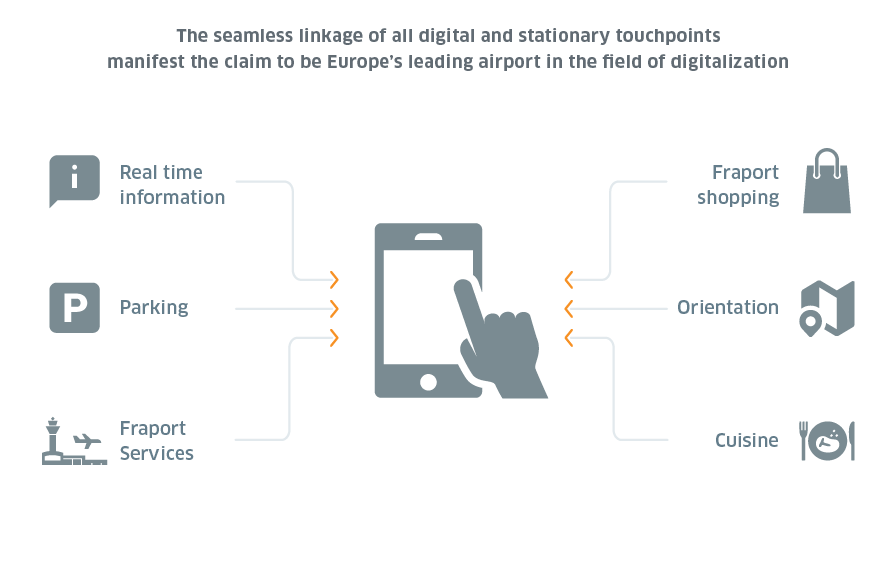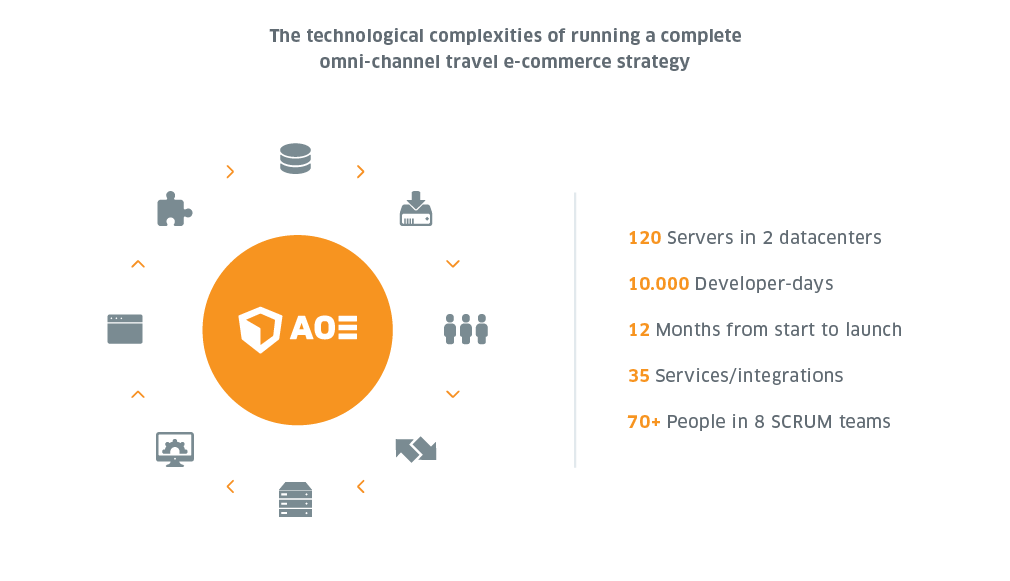Get in touch


The AOE team has created a unique Omnichannel platform for the Frankfurt Airport through an innovative development approach. The aim of the project was to connect travel-relevant information, service offerings and shopping opportunities – and thus to digitalize the Frankfurt airport. Background facts about the most demanding and comprehensive project in our history, to date.
The Frankfurt Airport is full of superlatives! With an annual passenger count of 61 million it is by far the largest airport in Germany, the second-largest in Europe after London Heathrow and number eleven in the world. To compare: 61 million passengers are more people than the combined population of Canada and Australia. This corresponds to handling over 160,000 passengers per day, or the population of a mid-sized city. Throw in some 80,000 people who work at the airport – more people than the Maracanã Stadium in Rio de Janeiro can hold.
The airport is operated by Fraport, the company that watches over the entire airport. In addition to flight operations, Fraport is also responsible for the infrastructure: Rental of areas to retailers and restaurants, parking space management and ad spaces, but also digital assets such as Wi-Fi hotspots, iBeacons and passenger data. Fraport determines departure and arrival gates, controls passenger flow, security areas and, thanks to passenger data, knows its customers. Some 200,000 people are at the airport every day – making it Germany’s largest mall. And the airport earns revenues with every Euro spent, as retailers pay a revenue-dependent premium.
At first glance the question may be allowed: Why does an airport need a digitalization strategy, why E-Commerce?
If you think about, however, you quickly reach the conclusion: Of course the digitalization of an airport makes sense! And in many respects.
For the most part passengers aren’t familiar with the surroundings – what then could be better than to offer additional services such as flight data, in-airport navigation and information about gate changes?
Travelers at the airport have a lot of time on their hands. Before and after check-in, in ques in the security area, waiting for connecting flights, at the gate, in the airplane – passengers spend a large part of their time with waiting. In addition, travelers who fly have relatively open wallets, many pass the time shopping for their families or to do something good for themselves. Why then not make waiting periods utilizable by offering services or providing the opportunity to easily shop online?
The airport knows its passengers and the paths they take through the premises – special offers can be displayed along the way, and customers can take advantage of a massage or use the VIP lounge free-of-charge thanks to loyalty points collected.
Thus, the airport has a variety of interests. To provide the most pleasant stay possible, offer an excellent variety of restaurants and shopping options and create optimum conditions for retailers so they can earn high revenues. In addition, Fraport offers its own premium services such as VIP lounges and limo- or gate-to-gate services.
Thus, digitalizing the airport makes sense from many perspectives. But, it’s more than an app or online shop. It’s about creating a network of travel-relevant information, services provided or the possibility to purchase every product available at the airport – even from those stores the passenger doesn’t even see.
Services of which passengers weren’t even aware of to date can now be moved front-and-center. Passengers receive additional information at no additional costs, as well as special offers and access to all shops and products at the airport. Retailers have an additional, digital stage and can increase revenues, which can be a particular advantage for those retailers located at the fringe of the premises. At the same time the airport improves its attractiveness for business of all sorts, earns through revenue sharing and can reward purchases through its Loyalty Program.
The complexity and requirements of the project were extremely high. The Magento platform had to provide peak performance while being scalable, so that large visitor numbers could be handled and, if needed, additional retailers and systems could be brought on board. Each retailer has its own product range with specific product data, ERP systems and logistics, all of which had to be integrated into the solution. Another challenge was integrating travel-relevant information such as flight delays or gate changes, service offerings and the loyalty program as well as the shopping options – all through a single application.
Of course, passengers needed to be able to freely choose how to receive the merchandise ordered. Whether through online purchase or pre-order and in-store pickup, delivery to the arrival- or departure gate or home delivery: Customers needed to have a seamless omnichannel experience, with an airport delivery time of no more than 45 minutes! Very impressive, as the Frankfurt Airport covers some 5,000 acres, about ten times the size of the Principality of Monaco. Or, put differently, the area of nearly 3,000 football fields.

The project went online in its first version in December 2015. Without major problems or delays. After twelve months of development from start to launch. At times more than 80 developers were working on the project in eight Scrum teams, in Agile cooperation with different Fraport departments and third-party service providers. During this time 35 services were integrated; 120 servers are in use in two data centers. Our terrific team successfully implemented Fraport’s vision in approximately 10,000 person days, which corresponds to 365 working days for 27.4 developers. We’re very proud!
The project won the Magento Imagine Excellence Award for Best Omnichannel Experience and could serve as a showcase example for shopping centers, train stations or inner cities. Similar structures and motivations to boost retail, strengthen the location and interconnect service offerings and shopping can be found here as well, at least in part. The Frankfurt Airport has taken this step as a pioneer and vanguard and has invested in the digital future – thus likely gaining a competitive advantage that cannot be underestimated.
Here you can find the complete Frankfurt Airport Case Study.